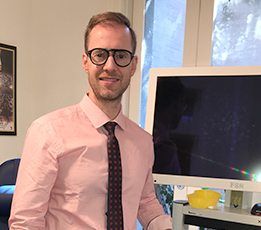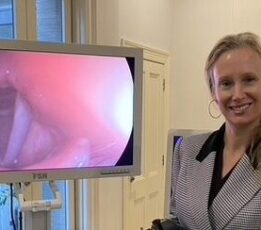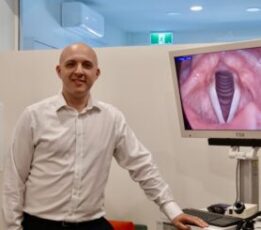Polyps
Definition:
Polyps are typically unilateral (on one vocal fold), benign (not cancerous) lesions of the vocal folds. They can vary in size and shape, but are generally like a smooth mound on the edge of the vocal fold where it contacts the opposite vocal fold. Often, there will be a ‘blood-coloured’ appearance to the polyp, but sometimes it is clear or translucent. The polyp can correspond with a reactive lesion of the oppositevocal fold (i.e. a small swelling that is a reaction to the trauma of colliding with the polyp), or other benign surface (epithelial) lesions.

Causes:
Vocal fold polyps are typically associated with misuse or heavy use of the voice, causing minor vocal fold trauma, a tear in the mucosa or localized bleeding of a blood vessel on the vocal fold. With repeated heavy use of the voice, the polyp can slowly enlarge
Diagnosis:
On clinical history, hoarseness with a reduced pitch range is the most common symptom but the hoarseness can vary depending on the size and location of the lesion. In addition, the sensation of a foreign body at the level of the vocal folds, or a feeling of wanting to clear the throat or cough is common.
Polyps can be detected via mirror laryngoscopy or video-nasendoscopy under normal light, although they are sometimes mis-diagnosed as vocal nodules.
Polyps are best diagnosed with stroboscopic light evaluation via oral or nasal endoscopy. This is a sophisticated assessment which gives an idea of the vibratory characteristics of the vocal folds, and allows for greater accuracy in diagnosis of vocal fold lesions.
Management:
Correct diagnosis of vocal fold lesions is the key to receiving appropriate management. If you have been diagnosed with a vocal polyp, a period of voice rest and voice therapy with a Speech Pathologist may be recommended to improve your voice. Small polypsmay resolve with therapy. However, it can be possible, to achieve a voice without getting rid of the lesion that is satisfactory with good vocal care and exercises. For many people, particularly professional voice users, satisfaction with their voice is only achieved after laryngeal microsurgery. Often the contact lesion on the opposite side also needs to be treated at the same time. Please discuss options for management with your Ear, Nose and Throat Specialist and Speech Pathologist.

Right True Vocal Fold polyp removedvia laryngeal microsurgical techniques (before and after removal)







